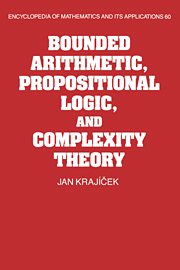Book contents
- Frontmatter
- Contents
- Preface
- Acknowledgments
- 1 Introduction
- 2 Preliminaries
- 3 Basic complexity theory
- 4 Basic propositional logic
- 5 Basic bounded arithmetic
- 6 Definability of computations
- 7 Witnessing theorems
- 8 Definability and witnessing in second order theories
- 9 Translations of arithmetic formulas
- 10 Finite axiomatizability problem
- 11 Direct independence proofs
- 12 Bounds for constant-depth Frege systems
- 13 Bounds for Frege and extended Frege systems
- 14 Hard tautologies and optimal proof systems
- 15 Strength of bounded arithmetic
- References
- Subject index
- Name index
- Symbol index
2 - Preliminaries
Published online by Cambridge University Press: 02 December 2009
- Frontmatter
- Contents
- Preface
- Acknowledgments
- 1 Introduction
- 2 Preliminaries
- 3 Basic complexity theory
- 4 Basic propositional logic
- 5 Basic bounded arithmetic
- 6 Definability of computations
- 7 Witnessing theorems
- 8 Definability and witnessing in second order theories
- 9 Translations of arithmetic formulas
- 10 Finite axiomatizability problem
- 11 Direct independence proofs
- 12 Bounds for constant-depth Frege systems
- 13 Bounds for Frege and extended Frege systems
- 14 Hard tautologies and optimal proof systems
- 15 Strength of bounded arithmetic
- References
- Subject index
- Name index
- Symbol index
Summary
In this chapter we briefly review the basic notions and facts from logic and complexity theory whose knowledge is assumed throughout the book. We shall always sketch important arguments, both from logic and from complexity theory, and so a determined reader can start with only a rough familiarity with the notions surveyed in the next two sections and pick the necessary material along the way.
For those readers who prefer to consult relevant textbooks we recommend the following books: The best introduction to logic are parts of Shoenfield (1967); for elements of structural complexity theory I recommend Balcalzár, Diáz, and Gabbarró (1988, 1990); for NP-completeness Garey and Johnson (1979); and for a Boolean complexity theory survey of lower bounds Boppana and Sipser (1990) or the comprehensive monograph Wegener (1987). A more advanced (but selfcontained) text on logic of first order arithmetic theories is Hájek and Pudlák (1993).
Logic
We shall deal with first order and second order theories of arithmetic. The second order theories are, in fact, just two-sorted first order theories: One sort are numbers; the other are finite sets. This phrase means that the underlying logic is always the first order predicate calculus; in particular, no set-theoretic assumptions are a part of the underlying logic.
From basic theorems we shall use Gödel completeness and incompleteness theorems, Tarski's undefinability of truth, and, in arithmetic, constructions of partial truth definitions.
Information
- Type
- Chapter
- Information
- Publisher: Cambridge University PressPrint publication year: 1995
